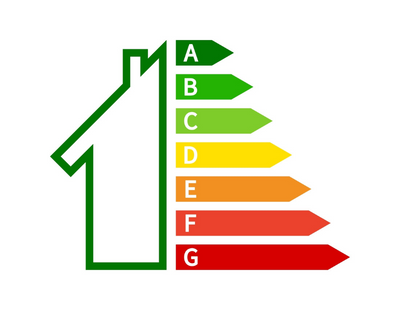Their properties were built between 1650 and 1999 and ranged from a one-bedroom flat to a five-bedroom detached house.
Which? uncovered issues with the accuracy of the results and the recommendations that homeowners received.
One homeowner had their EPC survey done, but never received their certificate. The survey fee was refunded, but the homeowner was left in the dark about their home's energy efficiency. Of the remaining 11 participants, just one was ‘very satisfied’ with their EPC and only three said they were likely to recommend getting an EPC, based on this experience.
Most participants (eight out of 11) told Which? their EPC did not appear to be accurate - they said the descriptions of key aspects of their home like the windows, roofs and heating systems were incorrect.
Several participants also felt that the recommendations suggested were unaffordable. One said that they felt draught proofing was overlooked in their EPC report despite their home having an open chimney and front door with single glazing.
One couple in Aberdeenshire achieved a D rating for energy efficiency for their 1980s four-bedroom semi-detached bungalow following their EPC assessment.
On receipt of the EPC, however, they noticed several discrepancies. There was no mention of their solar PV or solar thermal panels, or of a wood-burning stove. The suspended floor was described as uninsulated, although they had discussed their underfloor insulation with the assessor during the survey and offered to open an inspection hatch so this could be checked.
Which? contacted the assessor to point out the mistakes. After checking his survey notes, he admitted that there were omissions (which he blamed on the software) and offered to supply a new EPC.
The assessor issued a new, corrected EPC, with an improved B rating for energy efficiency.
Another Which? member also achieved a D rating for energy efficiency for her two-bedroom Victorian terraced house in London.
The EPC recommended several improvements, including internal or external wall insulation (typically costing £4,000 to £14,000 and saving £172 a year), suspended floor insulation (typically costing £800 to £1,200 and saving £70 a year,) solar water heating (typically costing £4,000 to £6,000 and saving £57 annually) and solar panels (typically costing £3,500 to £5,500 and saving £621 a year).
Installing all four could cost the Which? member in question up to £26,700 and she would only see the property rise by one band from D to C. She could save around £920 a year through installing all these energy efficiency measures - meaning it could take up to 29 years to recover the cost.
Which? says EPCs could provide valuable information on how people can save money and improve their home's efficiency but “they are in desperate need of reform.”
Which? is calling for the next government to reform EPCs to make them a more reliable and useful tool for householders. In addition to addressing concerns about the accuracy and reliability of EPCs, Which? believes the design and content of EPCs should be reformed to ensure it provides consumers with the information and advice they need. This should include information to help consumers prepare for the transition to low-carbon heating.
It says EPCs should also be made more interactive, so that consumers can input information so that the advice is more relevant to their circumstances. EPCs should also include up-to-date costings relevant to the type of property and provide links to any financial support and a database of installers belonging to government-certified schemes.
EPCs are based on assessments by Domestic Energy Assessors, who can qualify through several different accreditation schemes that provide online and in person training. Which? wants the next government should review auditing of EPCs and the training requirements for this role to ensure that assessors have the skills needed to complete reliable assessments.
Rocio Concha, Which? director of policy and advocacy, says: “With millions of families worried about high energy bills and the UK facing a big challenge to transition to low carbon heating, Energy Performance Certificates could be a helpful tool for consumers looking to save money and improve their home's efficiency in the future.
“However, our research shows they are in desperate need of reform - with current certificates often inaccurate and only suggesting costly improvements with long pay back periods.
“The next government must make Energy Performance Certificates a more reliable and useful tool for householders. This should include reviewing the auditing and training requirements for Domestic Energy Assessors and ensuring EPCs provide relevant information and clear, actionable advice for consumers.”














%20-%20IMAGE%20Client%20Accounting%20%E2%80%93%20what%20are%20your%20options.jpg)

%20(002).png)
.png)
.png)





Join the conversation
Jump to latest comment and add your reply
Cue Gibbo.
Ah Mr Annoying again. A sample of 12 people - gosh that's got statistical accuracy written all over it! The homeowner found some of the suggestions 'unaffordable'. Cricky, let's blame EPCs for the cost of external wall insulation and solar panels! My wife and I had a kitchen designer over to our home the other day and the cost of some of his suggestions were 'unaffordable'. QED we MUST STOP the installation of new kitchens - they're not fit for purpose!! How ridiculous.
We appear to have the usual suspects on this post who may have failed to keep their investment units up-to-scratch. The dinosaur fuel zealots with the 'life was so good in the 1980s' ideology. They do love to have a good moan about it!
It doesn't take much to put 2 x layers of Rockwool in a unit's loft, a sheet of 5cm thick Celotex on the inside of external facing walls and cash-in the generous £7,500 Government grant to install an efficient high-temperature electric heat pump from Octopus Energy. It's common sense.
Here he is. I wonder who he has been boring to death today?
Gibbo, I did not write the survey and Which? (unlike you) are a respected professional organisation. You make me laugh with your ideas. One of my flats has no loft. It is in a purpose built block on the fourth floor. How do I insulate the loft and get a heat pump up there, presuming the freeholder would consent?
Conspicuous by his silence
Probably standing for the 🤮Party. 😂😂😂
EPC's have always been a joke, hardly surprising when they cost next to nothing and even worse many are done 'in house' by agents or their preferred contractors who they charge a 25% introductory fee which is probably more than their profit.
EPC’s have no use or value because they are totally inaccurate- they were never designed for how they are being used now.
The primary use now is to provide yet another stick to beat private landlords with.
In other news, the sky is blue.
Can anyone find a government scheme which works properly?
Gibbo - you ate such a one track recod & it’s so predictable & BORING
Please login to comment